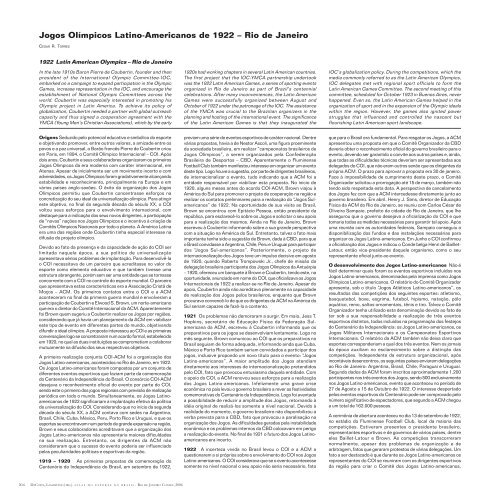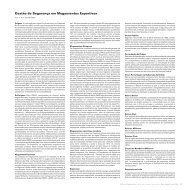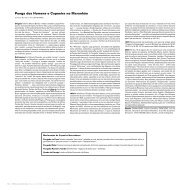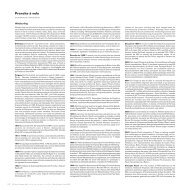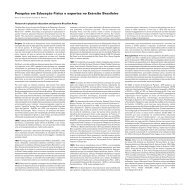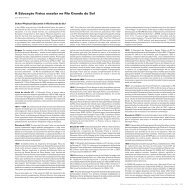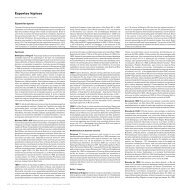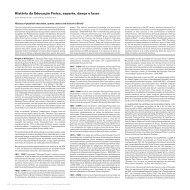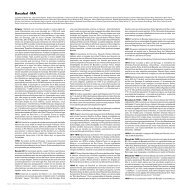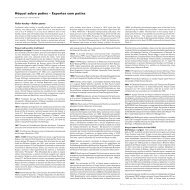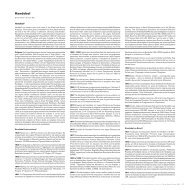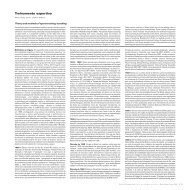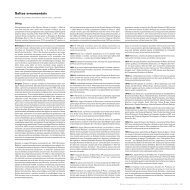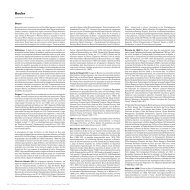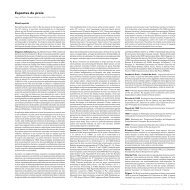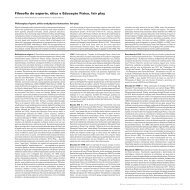Jogos Olímpicos Latino-Americanos de 1922 - Atlas do Esporte no ...
Jogos Olímpicos Latino-Americanos de 1922 - Atlas do Esporte no ...
Jogos Olímpicos Latino-Americanos de 1922 - Atlas do Esporte no ...
You also want an ePaper? Increase the reach of your titles
YUMPU automatically turns print PDFs into web optimized ePapers that Google loves.
<strong>Jogos</strong> <strong>Olímpicos</strong> <strong>Lati<strong>no</strong></strong>-<strong>America<strong>no</strong>s</strong> <strong>de</strong> <strong>1922</strong> – Rio <strong>de</strong> Janeiro<br />
CESAR R. TORRES<br />
<strong>1922</strong> Latin American Olympics – Rio <strong>de</strong> Janeiro<br />
In the late 1910s Baron Pierre <strong>de</strong> Coubertin, foun<strong>de</strong>r and then<br />
presi<strong>de</strong>nt of the International Olympic Committee-IOC,<br />
embarked on a campaign to expand participation in the Olympic<br />
Games, increase representation in the IOC, and encourage the<br />
establishment of National Olympic Committees across the<br />
world. Coubertin was especially interested in promoting his<br />
Olympic project in Latin America. To achieve its policy of<br />
globalization, Coubertin nee<strong>de</strong>d a partner with global outreach<br />
capacity and thus signed a cooperation agreement with the<br />
YMCA (Young Men’s Christian Associations), which by the early<br />
Origens Seduzi<strong>do</strong> pelo potencial educativo e simbólico <strong>do</strong> esporte<br />
e objetivan<strong>do</strong> promover, entre outros valores, a amiza<strong>de</strong> entre os<br />
povos e a paz universal, o Barão francês Pierre <strong>de</strong> Coubertin criou<br />
em Paris, em 1894, o Comitê Olímpico Internacional – COI. Após<br />
<strong>do</strong>is a<strong>no</strong>s, Coubertin e seus colabora<strong>do</strong>res organizaram os primeiros<br />
<strong>Jogos</strong> <strong>Olímpicos</strong> da era mo<strong>de</strong>rna com caráter internacional, em<br />
Atenas. Apesar <strong>de</strong> inicialmente ser um movimento incerto e com<br />
adversida<strong>de</strong>s, os <strong>Jogos</strong> <strong>Olímpicos</strong> foram gradativamente alcançan<strong>do</strong><br />
estabilida<strong>de</strong> e reconhecimento, principalmente na Europa e em<br />
vários países anglo-saxões. O êxito da organização <strong>do</strong>s <strong>Jogos</strong><br />
<strong>Olímpicos</strong> permitiu que Coubertin concentrasse esforços na<br />
concretização <strong>do</strong> seu i<strong>de</strong>al <strong>de</strong> universalização olímpica. Para atingir<br />
este objetivo, <strong>no</strong> final da segunda década <strong>do</strong> século XX, o COI<br />
voltou seus esforços para o envolvimento internacional, com<br />
<strong>de</strong>staque para a indicação <strong>do</strong>s seus <strong>no</strong>vos dirigentes, a participação<br />
<strong>de</strong> “<strong>no</strong>vas” nações <strong>no</strong>s <strong>Jogos</strong> <strong>Olímpicos</strong> e o incentivo à criação <strong>de</strong><br />
Comitês <strong>Olímpicos</strong> Nacionais por to<strong>do</strong> o planeta. A América Latina<br />
era uma das regiões on<strong>de</strong> Coubertin tinha especial interesse na<br />
difusão <strong>do</strong> projeto olímpico.<br />
Devi<strong>do</strong> ao fato da presença e da capacida<strong>de</strong> <strong>de</strong> ação <strong>do</strong> COI ser<br />
limitada naquela época, a sua política <strong>de</strong> universalização<br />
apresentava sérios problemas <strong>de</strong> implantação. Para <strong>de</strong>senvolvê-la<br />
o COI necessitava <strong>de</strong> um parceiro que acreditasse <strong>no</strong> valor <strong>do</strong><br />
esporte como elemento educativo e que também tivesse uma<br />
estrutura abrangente, porém sem ser uma entida<strong>de</strong> que se tornasse<br />
concorrente com o COI <strong>no</strong> controle <strong>do</strong> esporte mundial. O parceiro<br />
que apresentava estas características era a Associação Cristã <strong>de</strong><br />
Moços – ACM. Os primeiros contatos entre o COI e a ACM<br />
aconteceram <strong>no</strong> final da primeira guerra mundial e envolveram a<br />
participação <strong>de</strong> Coubertin e Elwood S. Brown, um <strong>no</strong>rte-america<strong>no</strong><br />
que era o diretor <strong>do</strong> Comitê Internacional da ACM. Aparentemente<br />
foi Brown quem sugeriu a Coubertin realizar os <strong>Jogos</strong> por regiões,<br />
consi<strong>de</strong>ran<strong>do</strong> que já havia um planejamento da ACM em viabilizar<br />
este tipo <strong>de</strong> evento em diferentes partes <strong>do</strong> mun<strong>do</strong>, objetivan<strong>do</strong><br />
difundir o i<strong>de</strong>al olímpico. A proposta interessou ao COI e as primeiras<br />
conversações logo se concretizaram num acor<strong>do</strong> formal, estabeleci<strong>do</strong><br />
em 1920, <strong>no</strong> qual as duas instituições se comprometiam a colaborar<br />
mutuamente na difusão <strong>do</strong>s seus respectivos objetivos.<br />
A primeira realização conjunta COI-ACM foi a organização <strong>do</strong>s<br />
<strong>Jogos</strong> <strong>Lati<strong>no</strong></strong>-america<strong>no</strong>s, aconteci<strong>do</strong>s <strong>no</strong> Rio <strong>de</strong> Janeiro, em <strong>1922</strong>.<br />
Os <strong>Jogos</strong> <strong>Lati<strong>no</strong></strong>-america<strong>no</strong>s foram compostos por um conjunto <strong>de</strong><br />
diferentes eventos esportivos que faziam parte da comemoração<br />
<strong>do</strong> Centenário da In<strong>de</strong>pendência <strong>do</strong> Brasil. O consórcio COI-ACM<br />
<strong>de</strong>sejava o reconhecimento oficial <strong>do</strong> evento por parte <strong>do</strong> COI,<br />
sen<strong>do</strong> este o primeiro <strong>do</strong>s jogos regionais com previsão <strong>de</strong> realização<br />
periódica em to<strong>do</strong> o mun<strong>do</strong>. Simultaneamente, os <strong>Jogos</strong> <strong>Lati<strong>no</strong></strong>america<strong>no</strong>s<br />
<strong>de</strong> <strong>1922</strong> significariam a implantação efetiva da política<br />
<strong>de</strong> universalização <strong>do</strong> COI. Consi<strong>de</strong>ran<strong>do</strong> que <strong>no</strong> início da segunda<br />
década <strong>do</strong> século XX, a ACM contava com se<strong>de</strong>s na Argentina,<br />
Brasil, Chile, Cuba, México, Peru, Porto Rico e Uruguai, e que os<br />
esportes se encontravam num perío<strong>do</strong> <strong>de</strong> gran<strong>de</strong> expansão na região,<br />
Brown e seus colabora<strong>do</strong>res acreditavam que a organização <strong>do</strong>s<br />
<strong>Jogos</strong> <strong>Lati<strong>no</strong></strong>-america<strong>no</strong>s não apresentaria maiores dificulda<strong>de</strong>s<br />
na sua realização. Entretanto, os dirigentes da ACM não<br />
consi<strong>de</strong>raram que o sucesso <strong>do</strong> evento po<strong>de</strong>ria ser influencia<strong>do</strong><br />
pelas peculiarida<strong>de</strong>s políticas e esportivas da região.<br />
1919 – 1920 As primeiras propostas <strong>de</strong> comemoração <strong>do</strong><br />
Centenário da In<strong>de</strong>pendência <strong>do</strong> Brasil, em setembro <strong>de</strong> <strong>1922</strong>,<br />
20.6 DACOSTA, LAMARTINE (ORG.). ATLAS DO ESPORTE NO BRASIL. RIO DE JANEIRO: CONFEF, 2006<br />
1920s had working chapters in several Latin American countries.<br />
The first project that the IOC-YMCA partnership un<strong>de</strong>rtook<br />
was the <strong>1922</strong> Latin American Games, a series of sporting events<br />
organized in Rio <strong>de</strong> Janeiro as part of Brazil’s centennial<br />
celebrations. After many inconveniences, the Latin American<br />
Games were successfully organized between August and<br />
October of <strong>1922</strong> un<strong>de</strong>r the patronage of the IOC. The assistance<br />
of the YMCA was crucial to the Brazilian organizers in the<br />
planning and hosting of the international event. The significance<br />
of the Latin American Games is that they inaugurated the<br />
previam uma série <strong>de</strong> eventos esportivos <strong>de</strong> caráter nacional. Dentre<br />
várias propostas, havia a <strong>de</strong> Nestor Ascoli, uma figura proeminente<br />
da socieda<strong>de</strong> brasileira, em realizar “campeonatos brasileiros <strong>de</strong><br />
<strong>Jogos</strong> <strong>Olímpicos</strong>”, a serem organiza<strong>do</strong>s pela Confe<strong>de</strong>ração<br />
Brasileira <strong>de</strong> Desportos – CBD. Aparentemente o Fluminense<br />
Football Club também manifestou interesse em organizar um evento<br />
<strong>de</strong>ste tipo. Logo houve a sugestão, por parte <strong>de</strong> dirigentes brasileiros,<br />
<strong>de</strong> internacionalizar o evento, tu<strong>do</strong> indican<strong>do</strong> que a ACM foi a<br />
entida<strong>de</strong> responsável por viabilizar esta proposta. No início <strong>de</strong><br />
1920, alguns meses antes <strong>do</strong> acor<strong>do</strong> COI-ACM, Brown viajou à<br />
América <strong>do</strong> Sul para promover o projeto <strong>de</strong> cooperação na região e<br />
realizar os contatos preliminares para a realização <strong>do</strong> “<strong>Jogos</strong> Sulamerica<strong>no</strong>s”<br />
<strong>de</strong> <strong>1922</strong>. Na oportunida<strong>de</strong> <strong>de</strong> sua visita ao Brasil,<br />
Brown se encontrou com Epitácio Pessoa, então presi<strong>de</strong>nte da<br />
república, para esclarecê-lo sobre os <strong>Jogos</strong> e solicitar o seu apoio<br />
para a realização <strong>do</strong>s mesmos. Ainda <strong>no</strong> Rio <strong>de</strong> Janeiro, Brown<br />
escreveu à Coubertin informan<strong>do</strong> sobre a sua gran<strong>de</strong> perspectiva<br />
com a situação na América <strong>do</strong> Sul. Entretanto, talvez o fato mais<br />
importante tenha si<strong>do</strong> a sugestão <strong>de</strong> Brown, dada à CBD, para que<br />
o Brasil convidasse a Argentina, Chile, Peru e Uruguai para participar<br />
<strong>do</strong>s “<strong>Jogos</strong> Sul-america<strong>no</strong>s”. Posteriormente, o projeto <strong>de</strong><br />
internacionalização <strong>do</strong>s <strong>Jogos</strong> teve um impulso <strong>de</strong>cisivo em agosto<br />
<strong>de</strong> 1920, quan<strong>do</strong> Roberto Trompowski Jr., chefe <strong>de</strong> missão da<br />
<strong>de</strong>legação brasileira participante <strong>do</strong>s <strong>Jogos</strong> <strong>Olímpicos</strong> da Antuérpia<br />
– 1920, ofereceu um banquete à Brown e Coubertin, ten<strong>do</strong> este, na<br />
oportunida<strong>de</strong>, anuncia<strong>do</strong> em <strong>no</strong>me <strong>do</strong> COI, que oficializava os <strong>Jogos</strong><br />
Internacionais <strong>de</strong> <strong>1922</strong> a realizar-se <strong>no</strong> Rio <strong>de</strong> Janeiro. Apesar <strong>do</strong><br />
apoio, Coubertin ainda não acreditava plenamente na capacida<strong>de</strong><br />
<strong>de</strong> realização <strong>do</strong>s <strong>Jogos</strong> pelos brasileiros, enquanto que Brown<br />
procurava convencê-lo <strong>de</strong> que os dirigentes da ACM na América <strong>do</strong><br />
Sul seriam capazes <strong>de</strong> fazê-lo a contento.<br />
1921 Os problemas não <strong>de</strong>moraram a surgir. Em maio, Jess T.<br />
Hopkins, secretário <strong>de</strong> Educação Física da Fe<strong>de</strong>ração Sulamericana<br />
da ACM, escreveu à Coubertin informan<strong>do</strong> que os<br />
preparativos para os jogos se <strong>de</strong>senvolviam lentamente. Logo <strong>no</strong><br />
mês seguinte, Brown comunicou ao COI que os preparativos <strong>no</strong><br />
Brasil seguiam <strong>de</strong> forma a<strong>de</strong>quada, informan<strong>do</strong> ainda que Cuba,<br />
México e Porto Rico também seriam convida<strong>do</strong>s a participar <strong>do</strong>s<br />
jogos, inclusive propon<strong>do</strong> um <strong>no</strong>vo título para o evento: “<strong>Jogos</strong><br />
<strong>Lati<strong>no</strong></strong>-america<strong>no</strong>s”. A maior amplitu<strong>de</strong> <strong>do</strong>s <strong>Jogos</strong> atendiam<br />
diretamente aos interesses <strong>de</strong> internacionalização pretendi<strong>do</strong>s<br />
pelo COI, fato que provocou entusiasmo daquela entida<strong>de</strong>. Com<br />
o apoio <strong>do</strong> COI, a ACM re<strong>no</strong>vou seus esforços para a realização<br />
<strong>do</strong>s <strong>Jogos</strong> <strong>Lati<strong>no</strong></strong>-america<strong>no</strong>s. Infelizmente uma grave crise<br />
econômica <strong>no</strong> país levou o gover<strong>no</strong> brasileiro a rever as festivida<strong>de</strong>s<br />
comemorativas <strong>do</strong> Centenário da In<strong>de</strong>pendência. Logo foi aventada<br />
a possibilida<strong>de</strong> <strong>de</strong> reduzir a amplitu<strong>de</strong> <strong>do</strong>s <strong>Jogos</strong>, retornan<strong>do</strong> à<br />
idéia original <strong>de</strong> realizá-los somente a nível nacional. Devi<strong>do</strong> à<br />
realida<strong>de</strong> <strong>do</strong> momento, o gover<strong>no</strong> brasileiro não disponibilizou a<br />
verba prevista para a CBD, fato que provocou a paralisação na<br />
organização <strong>do</strong>s <strong>Jogos</strong>. As dificulda<strong>de</strong>s geradas pela instabilida<strong>de</strong><br />
econômica e os problemas inter<strong>no</strong>s da CBD colocavam em perigo<br />
a realização <strong>do</strong> evento. No final <strong>de</strong> 1921 o futuro <strong>do</strong>s <strong>Jogos</strong> <strong>Lati<strong>no</strong></strong>america<strong>no</strong>s<br />
era incerto.<br />
<strong>1922</strong> A incerteza vivida <strong>no</strong> Brasil levou o COI e a ACM a<br />
questionarem a si próprios sobre o envolvimento <strong>do</strong> COI <strong>no</strong>s <strong>Jogos</strong><br />
<strong>Lati<strong>no</strong></strong>-america<strong>no</strong>s. O COI consi<strong>de</strong>rava que se o evento acontecesse<br />
somente <strong>no</strong> nível nacional o seu apoio não seria necessário, fato<br />
IOC’s globalization policy. During the competitions, which the<br />
media commonly referred to as the Latin American Olympics,<br />
IOC <strong>de</strong>legates met with regional sport officials to form the<br />
Latin American Games Committee. The second meeting of this<br />
committee, scheduled for October 1923 in Bue<strong>no</strong>s Aires, never<br />
happened. Even so, the Latin American Games helped in the<br />
organization of sport and in the expansion of the Olympic i<strong>de</strong>als<br />
within the region. However, the games also ignited power<br />
struggles that influenced and controlled the nascent but<br />
flourishing Latin American sport landscape.<br />
que para o Brasil era fundamental. Para resgatar os <strong>Jogos</strong>, a ACM<br />
apresentou uma proposta em que o Comitê Organiza<strong>do</strong>r da CBD<br />
<strong>de</strong>veria obter o reconhecimento oficial <strong>do</strong> gover<strong>no</strong> brasileiro para o<br />
evento, <strong>de</strong>ven<strong>do</strong> ser garanti<strong>do</strong> o convite aos outros países e, ainda,<br />
que todas as dificulda<strong>de</strong>s técnicas <strong>de</strong>veriam ser apresentadas aos<br />
<strong>de</strong>lega<strong>do</strong>s <strong>do</strong> COI, que não eram outros senão que os dirigentes da<br />
própria ACM. O prazo para aprovar a proposta era 30 <strong>de</strong> janeiro.<br />
Face à impossibilida<strong>de</strong> <strong>de</strong> cumprimento <strong>de</strong>ste prazo, o Comitê<br />
Organiza<strong>do</strong>r solicitou a prorrogação até 15 <strong>de</strong> março, também não<br />
ten<strong>do</strong> si<strong>do</strong> respeitada esta data. A perspectiva <strong>de</strong> cancelamento<br />
<strong>do</strong>s <strong>Jogos</strong> fez com que a ACM interce<strong>de</strong>sse diretamente junto ao<br />
gover<strong>no</strong> brasileiro. Em abril, Henry J. Sims, diretor <strong>de</strong> Educação<br />
Física da ACM <strong>do</strong> Rio <strong>de</strong> Janeiro, se reuniu com Carlos César <strong>de</strong><br />
Oliveira Sampaio, prefeito da cida<strong>de</strong> <strong>do</strong> Rio <strong>de</strong> Janeiro, que lhe<br />
assegurou que o gover<strong>no</strong> <strong>de</strong>sejava a oficialização <strong>do</strong> COI e que<br />
tomaria todas as medidas necessárias para garantir tal apoio. Após<br />
uma reunião com as autorida<strong>de</strong>s fe<strong>de</strong>rais, Sampaio conseguiu a<br />
disponibilização <strong>do</strong>s fun<strong>do</strong>s e das instalações necessárias para<br />
organizar os <strong>Jogos</strong> <strong>Lati<strong>no</strong></strong>-america<strong>no</strong>s. Em Junho o COI confirmou<br />
a oficialização <strong>do</strong>s <strong>Jogos</strong> e indicou o Con<strong>de</strong> belga Henri <strong>de</strong> Baillet-<br />
Latour, então vice-presi<strong>de</strong>nte daquele organismo, como o seu<br />
representante oficial junto ao evento.<br />
O <strong>de</strong>senvolvimento <strong>do</strong>s <strong>Jogos</strong> <strong>Lati<strong>no</strong></strong>-america<strong>no</strong>s Não é<br />
fácil <strong>de</strong>terminar quais foram os eventos esportivos incluí<strong>do</strong>s <strong>no</strong>s<br />
<strong>Jogos</strong> <strong>Lati<strong>no</strong></strong>-america<strong>no</strong>s, <strong>de</strong><strong>no</strong>mina<strong>do</strong>s pela imprensa como <strong>Jogos</strong><br />
<strong>Olímpicos</strong> <strong>Lati<strong>no</strong></strong>-america<strong>no</strong>s. O relatório <strong>do</strong> Comitê Organiza<strong>do</strong>r<br />
apresenta, sob o título “<strong>Jogos</strong> Atléticos <strong>Lati<strong>no</strong></strong>-america<strong>no</strong>s”, os<br />
resulta<strong>do</strong>s das competições <strong>do</strong>s seguintes esportes: atletismo,<br />
basquetebol, boxe, esgrima, futebol, hipismo, natação, pólo<br />
aquático, remo, saltos ornamentais, tênis e tiro. Talvez o Comitê<br />
Organiza<strong>do</strong>r tenha utiliza<strong>do</strong> esta <strong>de</strong><strong>no</strong>minação <strong>de</strong>vi<strong>do</strong> ao fato <strong>de</strong><br />
ter sob a sua responsabilida<strong>de</strong> a realização <strong>de</strong> três eventos<br />
esportivos distintos, to<strong>do</strong>s incluí<strong>do</strong>s na programação <strong>do</strong>s festejos<br />
<strong>do</strong> Centenário da In<strong>de</strong>pendência: os <strong>Jogos</strong> <strong>Lati<strong>no</strong></strong>-america<strong>no</strong>s, os<br />
<strong>Jogos</strong> Militares Internacionais e os Campeonatos Esportivos<br />
Internacionais. O relatório da ACM também não <strong>de</strong>ixa claro que<br />
esportes correspon<strong>de</strong>riam a qual <strong>do</strong>s três eventos. Nem os jornais<br />
da época auxiliam <strong>no</strong> esclarecimento sobre a distinção das<br />
competições. In<strong>de</strong>pen<strong>de</strong>nte da estrutura organizacional, após<br />
incontáveis <strong>de</strong>sencontros, os seguintes países enviaram <strong>de</strong>legações<br />
ao Rio <strong>de</strong> Janeiro: Argentina, Brasil, Chile, Paraguai e Uruguai.<br />
Segun<strong>do</strong> da<strong>do</strong>s da ACM foram inscritos aproximadamente 1.200<br />
participantes <strong>no</strong>s três eventos <strong>do</strong>s <strong>Jogos</strong>, sen<strong>do</strong> 500 exclusivamente<br />
<strong>no</strong>s <strong>Jogos</strong> <strong>Lati<strong>no</strong></strong>-america<strong>no</strong>s, evento que aconteceu <strong>no</strong> perío<strong>do</strong> <strong>de</strong><br />
27 <strong>de</strong> Agosto a 15 <strong>de</strong> Outubro <strong>de</strong> <strong>1922</strong>. O interesse <strong>de</strong>sperta<strong>do</strong><br />
pelos eventos esportivos <strong>do</strong> Centenário po<strong>de</strong> ser comprova<strong>do</strong> pelo<br />
número significativo <strong>de</strong> especta<strong>do</strong>res, que segun<strong>do</strong> a ACM chegou<br />
a um total <strong>de</strong> 162.000 pessoas.<br />
A cerimônia <strong>de</strong> abertura aconteceu <strong>no</strong> dia 13 <strong>de</strong> setembro <strong>de</strong> <strong>1922</strong>,<br />
<strong>no</strong> estádio <strong>do</strong> Fluminense Football Club, local da maioria das<br />
competições. Estiveram presentes o presi<strong>de</strong>nte brasileiro,<br />
representantes esportivos e <strong>de</strong> gover<strong>no</strong>s <strong>de</strong> vários países, <strong>de</strong>ntre<br />
eles Baillet-Latour e Brown. As competições transcorreram<br />
<strong>no</strong>rmalmente, apesar <strong>do</strong>s problemas <strong>de</strong> organização e <strong>de</strong><br />
arbitragem, fatos que geraram protestos <strong>de</strong> várias <strong>de</strong>legações. Um<br />
fato a ser <strong>de</strong>staca<strong>do</strong> é que durante os <strong>Jogos</strong> <strong>Lati<strong>no</strong></strong>-america<strong>no</strong>s os<br />
representantes <strong>do</strong> COI se reuniram com os dirigentes esportivos<br />
da região para criar o Comitê <strong>do</strong>s <strong>Jogos</strong> <strong>Lati<strong>no</strong></strong>-america<strong>no</strong>s,
objetivan<strong>do</strong> a realização <strong>de</strong>ste evento bienalmente. Este Comitê<br />
agen<strong>do</strong>u a sua segunda reunião para 1923, em Bue<strong>no</strong>s Aires, fato<br />
não concretiza<strong>do</strong>. A motivação gerada pela realização <strong>do</strong>s <strong>Jogos</strong><br />
<strong>Lati<strong>no</strong></strong>-america<strong>no</strong>s levou à fundação da Confe<strong>de</strong>ração Sul-americana<br />
<strong>de</strong> Ciclismo durante a realização <strong>de</strong>stes <strong>Jogos</strong>. Segun<strong>do</strong> Baillet-<br />
Latour, muitas foram as conquistas administrativas <strong>do</strong>s <strong>Jogos</strong><br />
<strong>Lati<strong>no</strong></strong>-america<strong>no</strong>s, fato que o motivou a continuar promoven<strong>do</strong> o<br />
i<strong>de</strong>al olímpico por toda a América Latina.<br />
Interpretações <strong>do</strong> <strong>de</strong>senvolvimento Os <strong>Jogos</strong> <strong>Lati<strong>no</strong></strong>america<strong>no</strong>s<br />
foi o primeiro projeto em conjunto que o COI e a<br />
ACM promoveram logo após o acor<strong>do</strong> oficial em que ambas as<br />
entida<strong>de</strong>s se comprometiam a colaborar na difusão <strong>do</strong>s seus<br />
respectivos objetivos. Devi<strong>do</strong> aos <strong>de</strong>sentendimentos inter<strong>no</strong>s na<br />
CBD, além das dificulda<strong>de</strong>s da eco<strong>no</strong>mia brasileira à época, a<br />
ACM teve uma participação <strong>de</strong>cisiva na organização <strong>do</strong>s <strong>Jogos</strong><br />
<strong>Lati<strong>no</strong></strong>-america<strong>no</strong>s. Talvez o fato mais marcante <strong>do</strong>s <strong>Jogos</strong> <strong>Lati<strong>no</strong></strong>america<strong>no</strong>s<br />
<strong>de</strong> <strong>1922</strong> tenha si<strong>do</strong> a inédita implementação da política<br />
<strong>de</strong> universalização <strong>do</strong> COI. Durante a sua presença <strong>no</strong> Brasil e<br />
após, quan<strong>do</strong> da sua viagem pela América Latina, Baillet-Latour<br />
estabeleceu uma re<strong>de</strong> <strong>de</strong> contatos com os dirigentes esportivos<br />
da região, através da qual esperava difundir o trabalho e os<br />
objetivos <strong>do</strong> COI. Isto permitiu ao COI selecionar membros lati<strong>no</strong>america<strong>no</strong>s<br />
para integrar o seu quadro <strong>de</strong> representantes<br />
internacionais, que por sua vez incentivaram o <strong>de</strong>senvolvimento<br />
esportivo na região, motivan<strong>do</strong> a participação <strong>no</strong>s <strong>Jogos</strong> <strong>Olímpicos</strong><br />
e também na realização <strong>de</strong> <strong>Jogos</strong> Regionais. A realização <strong>do</strong>s<br />
<strong>Jogos</strong> <strong>Lati<strong>no</strong></strong>-america<strong>no</strong>s também produziu efeitos negativos. A<br />
organização interna <strong>do</strong>s <strong>Jogos</strong> e a composição das <strong>de</strong>legações<br />
representantes <strong>do</strong>s países geraram polêmicas e lutas <strong>de</strong> po<strong>de</strong>r<br />
entre as entida<strong>de</strong>s que <strong>de</strong>sejavam li<strong>de</strong>rar o esporte a nível nacional.<br />
Era intenção <strong>de</strong> todas estas entida<strong>de</strong>s receberem o privilégio <strong>do</strong><br />
atendimento da ACM e <strong>do</strong> COI. Na implementação <strong>de</strong> suas políticas<br />
estas entida<strong>de</strong>s não consi<strong>de</strong>raram a dinâmica política, social e<br />
cultural da região, fato que favoreceu o confronto <strong>de</strong> interesses em<br />
vez <strong>de</strong> facilitar o entendimento e o estabelecimento <strong>de</strong> instituições<br />
estáveis e <strong>de</strong>mocráticas. Certamente o aspecto mais relevante <strong>do</strong>s<br />
<strong>Jogos</strong> <strong>Lati<strong>no</strong></strong>-america<strong>no</strong>s tenha si<strong>do</strong> a mobilização inédita que os<br />
mesmos possibilitaram ao esporte regional, levan<strong>do</strong> a que to<strong>do</strong>s os<br />
envolvi<strong>do</strong>s questionassem o esporte que <strong>de</strong>sejavam <strong>de</strong>senvolver, o<br />
que seriam capazes <strong>de</strong> construir e <strong>de</strong> alcançar, numa época em que<br />
a América Latina já não <strong>de</strong>sejava somente aceitar as conquistas<br />
esportivas <strong>do</strong>s europeus. (Tradução <strong>do</strong> espanhol, da contribuição<br />
original para o <strong>Atlas</strong> <strong>do</strong> <strong>Esporte</strong> <strong>no</strong> Brasil: José Carlos Eustáquio<br />
<strong>do</strong>s Santos – Editor).<br />
Fontes ARCHIVOS DEL COMITE OLIMPICO INTERNACIONAL,<br />
Lausana, Suiza; Ascoli, N. (1924) Projeto <strong>de</strong> Commemoração <strong>do</strong><br />
Primeiro Centenario da In<strong>de</strong>pen<strong>de</strong>ncia <strong>do</strong> Brasil. Rio <strong>de</strong> Janeiro:<br />
Revista <strong>de</strong> Lingua Portuguesa; DaCosta, L. (2002) Olympic<br />
Globalization: Sport Geopolitics or IOC Power Politics? En:<br />
Olympic Studies. Ed. DaCosta, L. Rio <strong>de</strong> Janeiro: Editora Gama<br />
Filho; De Franceschi Neto, M. (1999) Participação <strong>no</strong> Brasil <strong>no</strong><br />
The IOC and Latin American Olympics-<strong>1922</strong>, Rio <strong>de</strong> Janeiro<br />
LAMARTINE P. D ACOSTA<br />
In “Olympic Studies”, Editora UGF, Rio <strong>de</strong> Janeiro, 2002, pp. 95-100<br />
The Latin American Games, held in September <strong>1922</strong>, were<br />
actually a South American sport event inclu<strong>de</strong>d in the International<br />
Exhibition of Rio <strong>de</strong> Janeiro of that year. As such, those Games<br />
may have their impact assessed through two sources of information<br />
from local archives: the programs of the <strong>1922</strong> Exhibition events<br />
filed in Rio’s Historical and Geographic Institute (1) and the report<br />
from the Physical Education National Commission of Uruguay,<br />
published in the ‘Uruguay Sport’, its official magazine, in October<br />
<strong>1922</strong> (2). In both <strong>do</strong>cuments, the period which was given most<br />
emphasis goes from September 6 through September 16, <strong>1922</strong>.<br />
By cross comparisons, it was ack<strong>no</strong>wledged that Argentina, Brazil,<br />
Chile and Uruguay atten<strong>de</strong>d the event as representatives of the<br />
Latin American continent to compete for different types of sports<br />
such as athletics, boxing, tennis, fencing, swimming, springboard<br />
diving, water polo, equestrian, shooting and rowing. There was<br />
also a soccer competition associated with the Exhibition, <strong>no</strong>t the<br />
Games, which inclu<strong>de</strong>d Paraguay among the other countries<br />
mentioned above.<br />
The Fluminense Stadium, the largest sport facility found in Rio<br />
<strong>de</strong> Janeiro, was rebuilt in or<strong>de</strong>r to host the main competitions<br />
inclu<strong>de</strong>d in the Games’ program. Besi<strong>de</strong>s this location, other<br />
privileged places, such as Botafogo Bay and Derby Club, held<br />
rowing and equestrian competitions, respectively. Other<br />
competititons were also held in the Brazilian Army premises,<br />
and there was a cross country competition all the way on<br />
Corcova<strong>do</strong> Hill – the city’s most visited place – which anyone<br />
interested in could join. In all, in today’s review this availability<br />
suggests that the Games were <strong>no</strong>t marginal on account of the<br />
Exhibition’s structure, as often ascribed to Paris (1900) and Saint<br />
Louis (1904) similar jointly events. The atten<strong>de</strong>es of the Games<br />
were invited by the then Brazilian Sports Confe<strong>de</strong>ration, including<br />
athletes and sport clubs according to the ‘Uruguay Sport’ (3). Through<br />
diplomatic channels, however, the Brazilian Government invited<br />
the Latin American governments, thus legitimating national<br />
representations. Therefore, the lack of international eligibility<br />
criteria for calling upon athletes in Latin America was compensated<br />
by a direct and explicit Governmental intervention. Out of the fifty<br />
events inclu<strong>de</strong>d in the Exhibition Program, ten were sports events,<br />
a figure only equal to that of receptions and balls, which shows the<br />
outstanding importance of the Games and other sport activities<br />
during the <strong>1922</strong> In<strong>de</strong>pen<strong>de</strong>nce Centennial Festivities of the host<br />
country. The Exhibition Executive Commission also appointed an<br />
‘Athletic Games Commission’, as opposed to the other activities<br />
which were grouped by segments and whose hierarchy followed<br />
<strong>de</strong>cisions from the management executive group.<br />
In the following year, a<strong>no</strong>ther issue of the ‘Uruguay Sport’ published<br />
the verbatim report written by the Count of Baillet-Latour, who<br />
had come to Rio <strong>de</strong> Janeiro as the IOC official representative for<br />
the Games (4). The Count, who would become the IOC Presi<strong>de</strong>nt in<br />
1925, begins his narrative by stating how ho<strong>no</strong>red he was for having<br />
substituted for the then presi<strong>de</strong>nt in his visit to Latin America, thus<br />
disclosing that it was Coubertin himself who would have come.<br />
Baillet-Latour, then, summarizes his impressions about the mission<br />
he was in charge of (5): “The Games in Rio, as a whole, were <strong>no</strong>t<br />
perfect; however, the criticism ma<strong>de</strong> to them was extremely<br />
exaggerated... The Games in Rio were also responsible for giving<br />
Movimento Olímpico Internacional <strong>no</strong> Perío<strong>do</strong> <strong>de</strong> 1896 a 1925.<br />
Dissertação <strong>de</strong> Doutora<strong>do</strong>, Universida<strong>de</strong> Gama Filho;<br />
FEDERACION SUDAMERICANA DE ASOCIACIONES<br />
CRISTIANAS DE JOVENES (1927) Quince Años <strong>de</strong> Educación<br />
Física en las Asociaciones <strong>de</strong> América <strong>de</strong>l Sur. Montevi<strong>de</strong>o y<br />
Bue<strong>no</strong>s Aires: Editorial Mun<strong>do</strong> Nuevo; Gregory, M. (1990) Rio <strong>de</strong><br />
Janeiro <strong>1922</strong>-1923. Exposição Internacional <strong>do</strong> Centenario <strong>do</strong><br />
Brasil. En: Historical Dictionary of World’s Fairs and Expositions,<br />
1851-1988. Eds. Findling, J. and Pelle, K. New York: Greenwood;<br />
Johnson, E. (1979) The History of YMCA Physical Education.<br />
Chicago: Association Press; Latuorette, K. (1957) World Service.<br />
A History of the Foreign Service of the Young Men’s Christian<br />
Associations of the United States and Canada. New York:<br />
Association Press; Muller, N. & Tuttas, R. (2000) The Role of the<br />
YMCA: Especially that of Elwood S. Brown, Secretary of Physical<br />
Education of the YMCA, in the World-Wi<strong>de</strong> Expansion of the<br />
Olympic Movement During Pierre <strong>de</strong> Coubertin’s Presi<strong>de</strong>ncy. En:<br />
Bridging Three Centuries: Intellectual Crossroads and the Mo<strong>de</strong>rn<br />
Olympic Movement. Eds. Wamsley, K., Martyn, S., MacDonald G.<br />
y Barney, R. Lon<strong>do</strong>n, Ontario: The University of Western Ontario;<br />
TORRES, C. (2001) Tribulations and Achievements: The Early<br />
History of Olympism in Argentina. En: The International Journal<br />
of the History of Sport, 18, 3; TORRES, C. (2002) A Time of<br />
Conflict: Argentine Sports and the 1924 Olympic Team. En: The<br />
Global Nexus Engaged: Past, Present, Future Interdisciplinary<br />
Olympic Studies. Eds. Wamsley, K., Barney, R., and Martyn, S.<br />
Lon<strong>do</strong>n, Ontario: International Center for Olympic Studies.<br />
birth to a true wish to maintain the Latin American Games,<br />
consi<strong>de</strong>red to be the best way to prepare for the Olympic<br />
Games”. Before what the report classifies as “the Steering<br />
Committees’s lack of organization”, it praises ‘Dr. Trampowski’,<br />
the Brazilian organizer of the Games who passed away during<br />
the event, as well as “Messrs. Jess Hopkins and F. Brow, Y.M.C.A<br />
Physical Education directors in Montevi<strong>de</strong>o and Rio,<br />
respectively” (6). Even so, “<strong>de</strong>spite the competency of the<br />
Centennial Festivities”, Baillet-Latour presents a brief plan to<br />
“introduce the Olympic i<strong>de</strong>a in Latin American peoples because<br />
although with very few exceptions, their ig<strong>no</strong>rance was absolute...<br />
before trying to fix the <strong>de</strong>ficiencies which were <strong>no</strong>t taken into<br />
account by the Games”. He thus suggests “the creation of a<br />
National Olympic Committee... and a Steering Committee for<br />
the Latin-American Games” as a complement for both national<br />
and international affiliations of each type of sport (7).<br />
Sources (1) Instituto Histórico e Geográfico Brasileiro,<br />
“Programa <strong>de</strong> Comemoração e Regulamento Geral da Exposição<br />
<strong>de</strong> <strong>1922</strong>”, Arquivo – Centenário da In<strong>de</strong>pendência <strong>1922</strong>, Rio <strong>de</strong><br />
Janeiro; (2) Uruguay Sport, Juegos Atleticos <strong>Lati<strong>no</strong></strong>-<strong>America<strong>no</strong>s</strong><br />
a Efectuarse en Rio <strong>de</strong> Janeiro en Setiembre <strong>de</strong> <strong>1922</strong>,<br />
Montevi<strong>de</strong>o, octobre <strong>1922</strong> (i<strong>de</strong>ntification of author and pages<br />
<strong>no</strong>t available in this source); (3) Ibi<strong>de</strong>m, first page of the<br />
magazine, un<strong>de</strong>r the title “Antece<strong>de</strong>ntes <strong>de</strong> la Intervención <strong>de</strong>l<br />
Uruguay en Ellos”; (4) Uruguay Sport, Informe Presenta<strong>do</strong> por<br />
el Con<strong>de</strong> <strong>de</strong> Baillet-Latour sobre la Missión que se Cometiera<br />
el C.I.O. en América, Montevi<strong>de</strong>o, agosto 1923, pp. 1-7; (5)<br />
Ibi<strong>de</strong>m, pp. 1 – 2; (6) Ibi<strong>de</strong>m, p. 1; (7) Ibi<strong>de</strong>m, p. 2.<br />
DACOSTA, LAMARTINE (ORG.). A TLAS DO ESPORTE NO BRASIL. RIO DE JANEIRO: CONFEF, 2006 20.7


